The court that resolved trade disputes is set to close, further destabilising global trade
The World Trade Organisation’s (WTO) Appellate Body has been accepted as the final arbiter of trade disputes between nations since 1995, but will wind down on Wednesday, leaving no method of peacefully resolving trade disputes.
Explainer
The Appellate Body has seven judges appointed to it from around the world. Three are chosen to hear each dispute between nations or trading blocs.
The US administration under Donald Trump has been systematically opposing every nomination made in recent times. Only three judges remain in place, and two of those are retiring on Wednesday 11 December. This essentially closes the Appellate Body, leaving no agreed structure to resolve trade disputes.
Why it matters to farming
The EU has the highest food production standards in the world. Other countries and trading blocs want to export their food into the EU regardless of the use of hormones, traceability systems and disease status. The EU relies on the Appellate Body to uphold its right to insist that standards are a legitimate reason not to accept imports. Retaliatory trade restrictions or sanctions are not permitted. Now, trade quotas or tariffs could be imposed by, for instance, the US against the EU if it refuses to accept American dairy products.
Hogan expresses disappointment
The US government favours tariffs and trade wars over arbitration. Europe, in contrast, is strongly supportive of the Appellate body. EU Trade Commissioner Phil Hogan described it as “a regrettable and very serious blow to the international rules-based trade system”.
Hogan added: “We have lost an enforceable dispute settlement system that has been an independent guarantor, for large and small economies alike, that the WTO’s rules are applied impartially.
“The European Union remains a staunch supporter of the multilateral trading system and firmly believes that a WTO with an effective dispute settlement system is indispensable for ensuring open and fair trade. The EU [has] proposed interim appeal arrangements to those partners who are willing to continue to resolve disputes in a binding way in respect of the WTO rules. The European Commission will soon unveil further proposals to make sure that the EU can continue to enforce its rights in international trade matters should others block the system.






 This is a subscriber-only article
This is a subscriber-only article










SHARING OPTIONS: